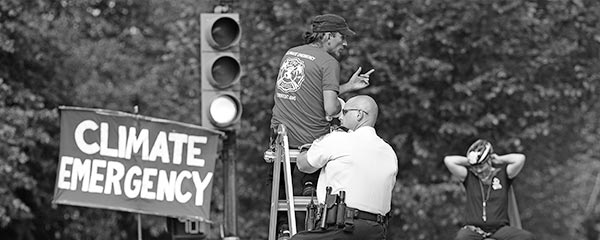This article is the fifth in a series that will analyze Gallup's latest March update on Americans' views on climate change and examine how these views have changed over time. The series will explore public opinion on the severity and importance of climate change, its causes and effects, the extent of Americans' understanding of the issue, and much more.
PRINCETON, NJ -- More Americans believe increases in the Earth's temperature over the last century are due to pollution from human activities (57%) than to naturally occurring changes in the environment (40%). The balance of views on this issue is essentially unchanged from 2013, but reflects broader agreement with the idea that mankind is responsible for global warming than was the case from 2010 through 2012, when barely half believed it. Agreement that human activities are responsible has yet to return, however, to the 61% level seen as recently as 2007.
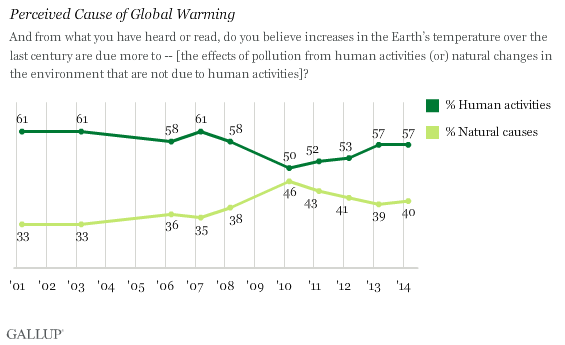
This trend comes from Gallup's annual Environment poll, a nationally representative telephone survey conducted each March since 2001. The 2014 update was conducted March 6-9.
Americans' prevailing view that human activity is responsible for global warming doesn't necessarily translate into concern over the issue. The percentage of Americans worried about global warming (as well as "climate change") still ranks low relative to other issues, and barely a third expect global warming to pose a serious threat in their own lifetime.
A Record 33% Say They Understand Global Warming "Very Well"
In the same survey, Gallup asks Americans to describe their general understanding of global warming, with 33% this year -- a record high -- saying they understand global warming "very well," up from 27% in 2013 and triple the level seen in the initial 1992 measure.
The proportion understanding the issue "fairly well" has also increased over the long term, from 42% in 1992 to 51% today, while the percentage who don't understand has dropped by more than half, from 44% to 16%.
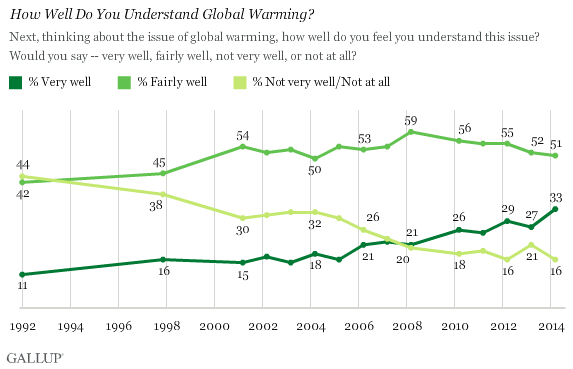
The Most Knowledgeable Are the Least Likely to Blame Humans
Leading climate science researchers in the U.S. and globally -- including those at the International Panel on Climate Change, a U.N. body that is at the forefront of climate research -- are convinced that elevated levels of carbon dioxide and other byproducts of fossil fuel use are the reason the Earth's temperature has warmed. Nevertheless, Americans who say they are highly knowledgeable about global warming are no more likely than those who profess little knowledge of the issue to believe humans are to blame.
In fact, in recent years, those with the highest level of knowledge -- those saying they understand the global warming issue very well -- are the least likely to believe global warming is the result of pollution from human activities. This is somewhat of a change from 2001 to 2007, when the most informed Americans were generally among the most likely of all knowledge groups to consider pollution the cause.
The pattern changed sharply between 2007 and 2010, when the most informed group became the most skeptical. That period spanned the release of some hacked emails in 2009 that global-warming skeptics say proved climate researchers were suppressing scientific information -- a controversy that ultimately became known as "Climategate."
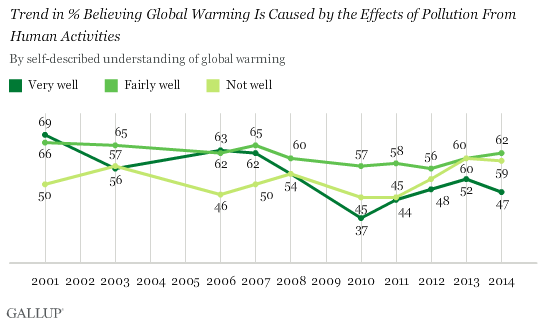
During about the same period, between 2008 and 2010, Republicans became much more likely to claim a solid understanding of global warming, while high understanding among Democrats remained relatively low. Since then, Democrats' knowledge has surged, while Republicans' has been fairly steady. Self-reported knowledge about the global warming issue is, however, up among all three political groups compared with a decade ago.
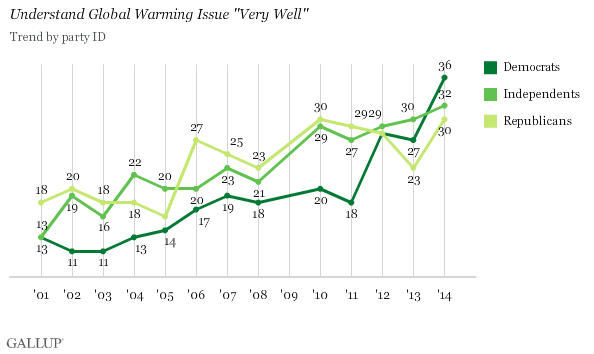
College Education Not a Strong Predictor of Blaming Human Activities
Apart from political party, Gallup finds little relation between Americans' levels of formal education and their agreement with the idea that human activities cause global warming -- a central tenet of climate change science. College graduates are just slightly more likely than adults without a college degree to believe human activities are to blame.
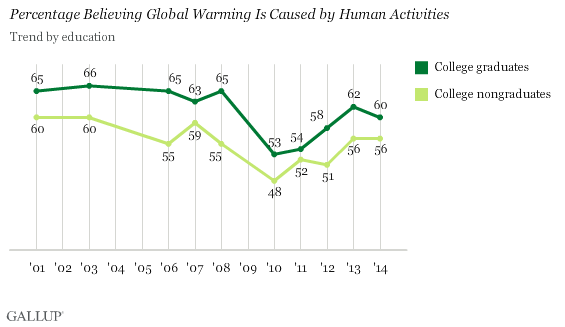
Perceived Cause of Global Warming Depends on Politics
Far more than knowledge, politics dictate the degree to which Americans believe humans are responsible for global warming, with Democrats much more likely to hold this position than are Republicans. And as Gallup trends document, the partisan gap on this has widened in recent years.
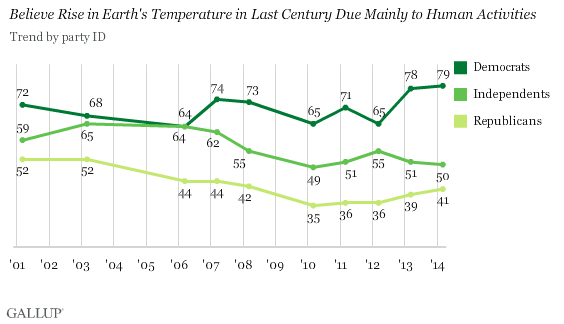
Bottom Line
Three times as many Americans say they understand global warming "very well" as said this two decades ago, rising to a record high 33% this year. And a combined 84% now profess to understand it very or fairly well, up from 53% in 2001. Despite this increased knowledge, slightly fewer Americans today than in 2001 agree with global warming proponents that the Earth's warming is "anthropogenic" -- in other words, the result of humans' influence on nature. The 57% who believe humans are the cause is up from the low point recorded in 2010 (50%), but still not back to earlier levels.
Importantly, public skepticism about the human role in global warming is not based on lack of education. College-educated Americans are barely more likely than those without a college degree to ascribe global warming to humans. Nor do Americans who consider themselves knowledgeable on the subject show more support for the pollution theory. Rather, as is the case with so many other measures of public attitudes on global warming, politics are the guiding force, with most Democrats accepting the prevailing scientific view that pollution is the cause and most Republicans believing it is a natural climatic cycle, not man-made.
Survey Methods
Results for this Gallup poll are based on telephone interviews conducted March 6-9, 2014, with a random sample of 1,048 adults, aged 18 and older, living in all 50 U.S. states and the District of Columbia.
For results based on the total sample of national adults, the margin of sampling error is ±4 percentage points at the 95% confidence level.
Interviews are conducted with respondents on landline telephones and cellular phones, with interviews conducted in Spanish for respondents who are primarily Spanish-speaking. Each sample of national adults includes a minimum quota of 50% cellphone respondents and 50% landline respondents, with additional minimum quotas by time zone within region. Landline and cellular telephone numbers are selected using random-digit-dial methods. Landline respondents are chosen at random within each household on the basis of which member had the most recent birthday.
Samples are weighted to correct for unequal selection probability, nonresponse, and double coverage of landline and cell users in the two sampling frames. They are also weighted to match the national demographics of gender, age, race, Hispanic ethnicity, education, region, population density, and phone status (cellphone only/landline only/both, and cellphone mostly). Demographic weighting targets are based on the most recent Current Population Survey figures for the aged 18 and older U.S. population. Phone status targets are based on the most recent National Health Interview Survey. Population density targets are based on the most recent U.S. census. All reported margins of sampling error include the computed design effects for weighting.
In addition to sampling error, question wording and practical difficulties in conducting surveys can introduce error or bias into the findings of public opinion polls.
View survey methodology, complete question responses, and trends.
For more details on Gallup's polling methodology, visit www.gallup.com.
